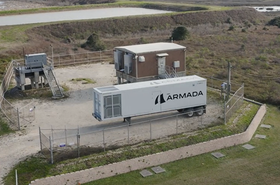Akamai has expanded its artificial intelligence (AI) offering with the launch of Akamai Cloud Inference.
The company has also made video processing units (VPUs) available via Akamai Cloud Accelerated Compute Instances, designed for media transcoding.
Akamai Cloud Inference, launched on March 27, brings AI inferencing capabilities to Akamai's distributed platform.
The company has a significant Edge footprint, with servers located in more than 700 cities with 4,300 points of presence, and has been rapidly expanding its offerings in the last few months, including launching a managed container service.
The company's Cloud Inference offering builds on the partnership earlier this month with Vast Data, which saw the companies combining Akamai's distributed platform with Vast Data's technology for data-intensive computing to speed up inference workloads.
“Getting AI data closer to users and devices is hard, and it’s where legacy clouds struggle,” said Adam Karon, chief operating officer and general manager of the Cloud Technology Group at Akamai. “While the heavy lifting of training LLMs will continue to happen in big hyperscale data centers, the actionable work of inferencing will take place at the Edge where the network Akamai has built over the past two and a half decades becomes vital for the future of AI and sets us apart from every other cloud provider in the market.”
According to Akamai, its inference offering can deliver 3x better throughput while reducing latency up to 2.5x while bringing workloads closer to end users. The company's distributed network is capable of delivering over one petabyte per second of throughput for data-intensive workloads.
The Inference Cloud is comprised of CPUs, GPUs, and tailored ASIC VPUs - a new addition to Akamai's "compute arsenal."
Akamai brings VPUs to the cloud
In addition to the launch of Akamai's Cloud Inference platform, the company has added video processing units (VPUs) to its offering via its Akamai Cloud Accelerated Compute Instances.
The VPUs are NETINT-designed and optimized for media transcoding. According to Akamai, it is the first cloud provider to offer VPUs in the cloud.
The company says the specialized chips are designed to perform specific tasks more efficiently than GPUs, in this cast for high-quality video streaming with reduced energy consumption.
The VPUs - dubbed Quadra T1U - are a single-chip solution that supports encoding resolutions up to 8Kp60 in industry-standard formats including AV1, HEVC, and H.264 with 8/10 bit support, including HDR. Quadra T1U can encode 32 live streams at 1080p30 broadcast quality.
“By bringing traditionally hardware-confined power to the cloud, we’re removing barriers that have held businesses back. Companies can now cut costs, scale seamlessly, and deliver better streaming experiences—solving a major industry challenge that’s been overlooked for too long,” said Jon Alexander, vice president of product management, Akamai. “Being the first cloud provider to offer VPUs gives Akamai a new competitive edge to expand our long-existing relationships with our media partners.”
Akamai was previously known for its CDN business, but has since refocused on cloud and security offerings. In its most recent quarterly earnings, the company had a revenue of $1.02 billion for the quarter, up three percent year-over-year (YoY), of which it said 69 percent came from security and compute. Full-year revenue was $3.991 billion, up five percent YoY, of which security and compute was 67 percent, growing 18 percent YoY.







